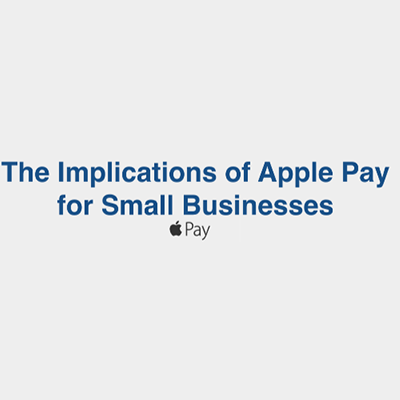In October, Apple completely changed the definition of a wallet with the introduction of Apple Pay. Despite that coolness factor, many small business owners remain concerned over how this technology will affect their retail locations. Apple Pay will essentially let you pay for merchandise with a swipe of your phone, but to fully understand how Apple Pay will impact financial transactions, business owners need to be aware of some of the following concerns.
Will my customer’s information or mine be put at risk through Apple Pay?
I thought that peoples pictures were hacked from the Apple Cloud
No. The recent hacking of information stored on Apple’s iCloud has prompted the development and improvement in Apple’s security platform and capabilities. As a result, only a customer will be able to access his or her own personal information and available methods of payment. Furthermore, no business or customer transactions will be tracked for the benefit of Apple. The only information available will be the information similar to a customer’s visible transactions on a bank account.
How Do I Prevent Fraud when a Customer Uses Apple Pay?
If a customer loses their phone and it is being used for unauthorized transaction they can use the Find-My-Phone feature of their iPhone, Apple Watch, or Apple iPad to disable and locate their devices. However, the customer remains responsible for disputing any transactions completed prior to disabling Apple Pay with Apple Support. Unlike credit cards Apple Pay utilizes two additional levels of fraud protection which include a fingerprint scan and sophisticated screen lock technology to prevent unauthorized use, so you can rest assured that every security step has been taken to prevent fraud for customers using Apple Pay.
Currently, My Business Accepts All Major Credit Cards and Cash; How Do I Accept Apple Pay?
In order to accept Apple Pay, you need to determine if your current system allows for payment using near-field communications. If you terminal already supports NFC you’ll be able to accept Apple Pay, but if not you may be interested in the emv90x payment terminal which handles not only Apple Pay but also EVM Chip and Pin technology which will be mandatory for all businesses by October 2015.
What Is Near-Field Communications?
Near-field communications technology works by transmitting data from a respective card–or in this case the Apple device–to the register where the transaction is completed. For example, in Europe most retailers already have this technology and use it to create a unique payment code that cannot be replicated by hackers or anyone else. You may have seen this technology in use at some major corporations, such as McDonald’s, Panera Bread, and others.
How Will Apple Pay Impact My Bottom Line?
In the modern age, keeping financial information secure has become a priority, and Apple Pay is one of the most secure means of keeping financial information confidential. You will receive payment to your account the same as you would with any of your other credit, debit, or even electronic-checking payment methods. It is anticipated that because of the extra security and authentication requirements credit card fraud will go down. Please consult with your merchant processor to determine if there will be any change in your fees, which should rarely exceed your current fees for accepting debit or credit cards. In addition to this, you may have customers choose e-receipts which will result in less waste.
Will Apple Pay Improve My Customer Satisfaction in My Business?
Choosing to use Apple Pay in your business shows your customers you are on-board with the latest technologies. Furthermore, your customer confidence will increase as they realize you are doing your fair share to prevent the all too common credit card theft. No longer will your customers have to dig through wallets, bags, or pockets to find an elusive payment card. They will be able to quickly pay with the swipe of their phone and instantly receive e-receipts and notification of payment that can be stored electronically on their phone instead of saving paper receipts.

